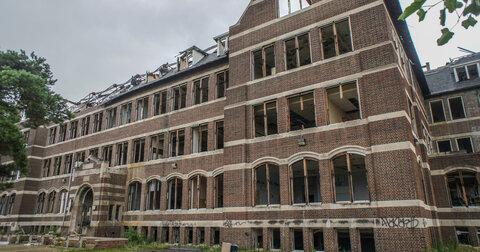Legislature targets charter school blight, ignores district-owned eyesores
Legislators should require school districts to let charter schools use their old buildings, one advocate says
The Democratic-controlled Senate’s spending plan for higher education in the 2026 state budget includes financial penalties for universities whose charter schools have blighted buildings.
When a public charter school gets its authorization (charter) from a public university, the university is able to collect up to 3% of the money state taxpayers send to the school for each student. The Senate’s budget plan would take way from a university some of that money if one or more of the schools it authorized closes and its building is blighted. In the extreme, the university would lose all the fees it collects for serving as an authorizer.
An advocate for charter schools says the concerned is misplaced. “If the Legislature is concerned about blighted school buildings, they should require school districts to let charter schools have access to closed and unneeded buildings,” Dan Quisenberry, president of the Michigan Association of Public School Academies, told Michigan Capitol Confidential in an email.
The problem of blighted buildings is most commonly found in conventional school districts, which have many more buildings than charter schools. A city of Detroit website addresses the issue of blight due to abandoned public-school buildings that affect surrounding communities.
The city conducted a study on what to do with 63 vacant school properties of historic vintage. Detroit’s school district owns 24 of those buildings, according to the website, and 39 are owned by the city.
Charter schools sometimes have trouble finding suitable buildings, thanks in part to opposition from local school districts, Quisenberry said.
One example is found in Detroit, where the Detroit Public Schools Community District fought to keep a former public school building empty through a deed restriction.
Kyle Smitley, who founded the Detroit Achievement Academy, needed a new building and found one that was once owned by the school district. But the district fought to keep her school out of the building.
“After our school had to fight tooth and nail to be able to cut through an illegally placed deed restriction put in place by Detroit Public Schools in order to buy and restore a blighted school building, I feel scared to hear about any legislation that holds one governance type to a different, trickier standard in doing the right things for buildings,” Smitley told CapCon in an email.
Partly as a result of Smitley's plight, the state enacted the Educational Instruction Access Act, which prohibits public school districts from putting deed restrictions on their former buildings.
Smitley added that when districts hoard old buildings out of fear, students lose out on a great school option and neighborhoods see their property values depressed due to the eyesore.
Sen. Sean McCann, D-Kalamazoo, who requested the change to Senate Bill 167, didn't respond to an email requesting a comment. The bill passed the Senate on a 19-18 party line vote and was sent to the House Committee on Appropriations May 13.
Michigan Capitol Confidential is the news source produced by the Mackinac Center for Public Policy. Michigan Capitol Confidential reports with a free-market news perspective.


 Member of state ed board called for ending charter schools
Member of state ed board called for ending charter schools
 House Bill 5025 does not fix any problems, creates new ones
House Bill 5025 does not fix any problems, creates new ones
 Payouts from Michigan’s teacher loan program plummet 97% after rule change
Payouts from Michigan’s teacher loan program plummet 97% after rule change